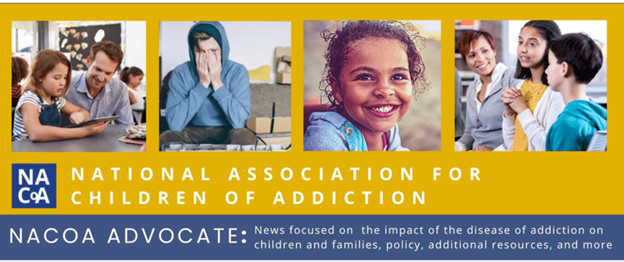Help Children Develop an Attitude of Gratitude This Thanksgiving Season
Gratitude isn’t just for adults. Pint-sized, it helps children balance out negative emotions and stress, find more energy, and increase overall contentment. This state actually reduces incessant complaining, helps boost the brain’s ability to learn, and improves a child’s ability to make better decisions. NACoA’s infographic How to Help Children Develop an Attitude of Gratitude provides some great ideas on how caring adults can help nurture an attitude of gratitude. Even when things are hard and times are challenging, being grateful for seeing a beautiful red cardinal, hearing a baby brother giggle, or smelling fresh baked cookies can help brighten a moment, a mood, and a child’s overall attitude. It isn’t minimizing the hardship, it’s an acknowledgement that there are also beautiful moments each day as well. Remember, the best way caring adults can teach children is by showing them, not just telling them! Phrases like “Isn’t that beautiful?” “Smell those autumn leaves” or “Listening to our cat purr just makes me so happy” can be contagious. It goes a long way to help the children you love develop a healthy attitude of gratitude.
|
Save the Date – COA Awareness Week 2025 Join the growing number of caring adults from around the world who come together each year for this important week of advocacy and care for children impacted by the disease of addiction. We can break the silence that isolates them and show them they are not alone.
More information is coming in December so you can create your own advocacy plans and events! Together we can shine a light around the world on these hidden hurts and bring hope and healing to COAs everywhere. |
|
|
Addressing the Stigma Around Substance Use Disorders
Words matter. This is a great course to better understand the stigma related to SUDs and how to speak more respectfully and responsibly about those struggling and the families who love them. Help change the language to help minimize stigma in this country.
Participants will learn about the intersection between addiction and criminal justice stigma, different types of stigma, the social construct of stigma at structural and individual levels, and approaches to respond to stigma in health and justice settings. The course features presentations from leading researchers and practitioners from NACoA, NID, University of DE, Yale University, and Addiction Policy Form.
JCOIN is part of NIH's Helping to End Addiction Long-term (HEAL) integrated set of research initiatives, designed to provide scientific solutions to the opioid crisis. One of NIH's HEAL initiatives focuses on optimizing effective treatment effects for justice involved individuals. Within this focus, NIDA launched JCOIN with the vision that every individual involved in the justice system with a substance use disorder should have access to effective treatment, whether detained or residing in the community.
Learn More and Register Here>> |
NACoA ACOA Online Education and Discussion Group
These meetings are designed to educate adults about the impact of the disease of addiction on children, and how it can continue to affect them in adulthood. Through these presentations, adults can learn more about the impact, find hope that support is available, and learn how to heal from this impact and live healthier lives. Past meeting presentations are now available on NACoA’s website. This ever-expanding list of presentations include: What is an ACOA and resilience?; Being a Child, What It Feels Like and How it Impacts Us; Healing Through Parenting: For You and Your Family; and much more. These meetings are provided on the second Thursday of each month, at 6pm ET.
Upcoming Meeting December 12, 6pm ET Topic: Monkey Chatter 101: Quieting the Voice in Your Head
Presenter: Margaret Swift Thompson, Executive Director of Embrace Family Recovery, LLC & Author Are you tired of the exhausting chatter playing in your head? This “monkey” keeps us other focused and fixated on fixing, managing, and controlling. Learn more about your Monkey Chatter and ways to tame it. Register>> |
Each month NACoA publishes important blogs to help educate about the impact of addiction on children, how to help kids and teens heal, and what adults can do who are still struggling with the impact. Resilience is available for children of all ages, and NACoA provides information, education, and additional resources through these informative and reflective articles. |
|
|
CDC Youth Risk Behavior Survey 2023 High School Students Self Reporting ACEs
Adverse Childhood Experiences (ACEs) are preventable, potentially traumatic events, occurring before age 18 years. Historically, data on ACEs among adolescents in the United States have primarily been collected through parental reporting. The CDC 2023 Youth Risk Behavior Survey findings present the first self-reported ACEs among US high school students, and estimates associations between ACEs and 16 health conditions and risk behaviors. ACEs and the disease of addiction are highly prevalent public healthy challenges and have been shown to be strongly correlated. Prevention of ACEs reduces risks in families impacted by addiction and improves protective factors to improve a child’s quality of life throughout the lifespan.
Learn More>>
|
NACoA is grateful for each and every caring adult - professionally or personally – who is making a difference in the life of a child impacted by the disease of addiction in the family. Thank you for all you do to make a difference in their lives. We appreciate you!
|
|
|
Contact Us:
nacoa@nacoa.org | 301.468.0985 National Association for Children of Addiction
615 Baltimore Pike, STE H #1158
Bel Air, Maryland, 21014 CFC#12020
Unsubscribe |
|
|
|
